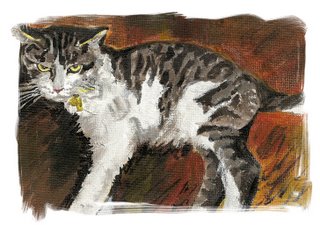There is a certain anger in a region of the East,
Where clerics rule the day and guard their honor to the least,
Where insults to their class are censored (not allowed to see the light),
The system’s quite effective, showing off their weighty might.
The younger generation, which emulates the West,
Won’t accept that theocratic rule is probably the best.
Having missed the revolution, being born a few years late,
There are aspects of true freedom they do not appreciate.
That despotic rule of tyrants is expelled they cannot see.
They know they want to imitate what’s on satellite TV.
Believing in a better world in the Western Hemisphere,
And seeking their identities in the “culture” they see there,
They’ve lost the sense of liberty their parents fought to gain.
And search for satisfaction in a worldview that’s insane.
Their clothes are slowly falling off; their dignities are lost.
They seek a brand new in-group, and don’t calculate the cost.
Forgetting their own culture, their ancestral heritage,
They vainly make a struggle, to conform to the new age.
The other side of earth laughs at their foolish, vain attempts.
The Western world looks on in cunning, cruel contempt.
The old man Uncle Sam has got them in his grip.
His master plan is working, they’re surely soon to slip.
In foolish adoration of consumer culture fads,
Despising parent’s intrusiveness and a government gone bad,
Having lost their sense of purpose, and following the stream,
With an imbecilic blindness, in a net of artful schemes,
With an illusory goal in mind, worshipping false idols,
With the intention of acceptance, they’ve lost all their morals.
Sad old bearded faces look on helplessly and dreading.
“What happened to the work we did, to prevent all this from spreading?”
“Who’s at fault?” we wonder, shepherd, sheep or fox?
Who has caused the helpless children to be utterly so lost?
Has the shepherd been neglectful of his multitude of flocks?
Has he made the field too vast and let them roam too far to dock?
No, his eye’s been watchful, and he’s banned the poisoned herb…
Then what has caused this trouble, this rebellion so unheard…
Of course, we know he’s been a tiny tad too strict.
A field to graze, he’s given, but too small and in such constrict!
“And what can be beyond this fence?” they wonder with a sigh,
The grass invariably greener on that far, restricted side.
And as Adam’s apple tempts, the devil’s grass does too.
And the sneaky serpent slyly slips in, with a charm or two.
Lo and behold! The evil has set in.
And as did the children of Israel, they exalt the calf of sin!
And though the warnings came, invariable and strong,
They carried off on their parade, and said: “Come join this throng!”
And in their net of fantasies, the glitter in their eyes,
They made a feast of forbidden fruit, believing in true lies.
The promise of the devil is invariably broke,
And we know the dark bond in which their names were feverishly wrote!
For the gains they’ll gain are nothing, they have paid with their own souls!
And though they are responsible, another can’t repose.
For who was first to deprive them of their childish, wanton hopes?
And who did strive to guide them by binding them with ropes?
And though they blocked their ears to reason, who listened to their needs?
Who let the devil infiltrate, with his selfishness and greed?
Whose vain attempts at censorship caused anger to unfold?
Who tried to block out something that he could not hope to hold?
Who did not see, he should let it be, and let them use their minds?
Who neglected to take an extra step, to show his aim was kind?
Who forgot the reverse psychology of taboo labels on the mind?
Who tried to keep a flock fenced in, giving notions of being behind?
The answer is THE GOVERNMENT, who despite its many tries,
Did not attempt to understand, and did not realize,
The effect of propaganda upon the childish soul,
And in its leaky, little boat, forgot to patch a hole.
Nov. 2005
 These paintings are of a cat I used to play with as a child. His name was Pinker, because he was pinker than his companion, Cripa, who had a spot on her nose.
These paintings are of a cat I used to play with as a child. His name was Pinker, because he was pinker than his companion, Cripa, who had a spot on her nose. 




